- Home
- Janice Kay Johnson
All That Remains Page 2
All That Remains Read online
Page 2
Alec yanked on the rope then kicked and fought for the surface. His fellow rescuers dragged him in. At the shouted questions, he shook his head even before hands pulled him onto the bridge, where he lay shaking.
Somebody wrapped him in a blanket. They were a disparate group—two men he didn’t know who he thought were National Guard and himself, a police homicide detective. They held some discussion and decided they had to bring the bodies up.
It turned out to be grueling. They took turns going down and hammering on the window with a tire wrench until they succeeded in shattering it and could unbuckle the bodies, one at a time, and drag them out.
In the complete exhaustion afterward, Alec wondered how long the two had been dead. He and the others could have been rescuing someone still living. He thought of the stranded motorists he’d earlier plucked from the roofs of their cars, each and every one of them sure they could drive through the river their street had become. Stupid, yes, but who had anticipated the speed with which the floodwaters had risen?
These two, he thought, as he helped heave the two drowning victims into the back of an army vehicle, wouldn’t be the last he’d see.
The Spesock River flooded regularly, but not like this. There had been talk about the hundred-year flood levels, although no one really took it seriously. It was hard to in this era of weather as entertainment and forecasts that seemed more hyperbole than fact. But these past weeks of endless, drenching rains had saturated the ground. Flash floods came along every few years in Arkansas, but this time the water kept rising. There was nowhere for it to go. It swallowed houses and roads and farms. When Alec had last stopped briefly at the emergency operations center—set up at the redbrick Mountfort City Hall—he’d heard that nearly one quarter of the county was submerged. He could believe it. He’d spent almost thirty-six hours in a borrowed aluminum fishing boat, and it was hard not to pause and stare in disbelief at the dark, swirling waters turning a once familiar landscape into something his eyes didn’t want to believe.
He waved goodbye to his helpers and returned to his boat. The aging Mercury outboard motor started with a cough and burst of oily smoke, but it obliged when he swung it in an arc that would lead him to Saddler’s Mill. He was so damn cold he had to return to one of the emergency shelters and find dry clothes before he could do any more.
This one had been set up in a high-school gymnasium. Donated cots and bedrolls were packed closely together. After changing clothes, Alec stopped to talk to several people he knew.
Jim Hunt and his wife had celebrated their sixtieth wedding anniversary last year. Alec knew, because his mother had written him about it. Now they were in the shelter, and the couple of suitcases tucked beneath the pair of cots were all they’d been able to salvage. Not much from a lifetime.
“I suppose the whole sheriff’s department is out there,” Mr. Hunt commented.
A nod was enough answer. Alec doubted a single sheriff’s deputy or detective had stayed home, not when the people they were hired to protect were in danger. Earlier, he’d seen a lieutenant, red-eyed with fatigue, delivering a woman and child to a shelter.
“Have you seen my sister and her family?” Alec asked, as he had every time he saw anyone he knew today.
Mr. Hunt shook his head. “They’re probably at one of the other schools.” His expression was kind. “Don’t worry. Randy’s a good man. He’ll take care of his own.”
Alec nodded his thanks, although he wasn’t so sure. Randy liked his booze. What if he’d been at the tavern when the flash flood rushed down the river?
On the way out of the gym, Alec stopped to gulp a cup of coffee and eat a sandwich. It was the first food he’d had since…hell, he couldn’t remember. Last night? He remembered a bowl of chili over at the Hagertown Grange Hall. He hadn’t wanted to stop even that long; there were folks all over town waiting to be rescued from upstairs windows or roofs, some in even more desperate circumstances. But he had the sense to know he had to fuel his body if he was to keep on without sleep.
During the never-ending day, Alec brought a dozen more people in from outlying homes before he conceded defeat and slept for several hours at a fire station that was high and dry. Cots had been set up here, too, for rescue workers like him. Cops from a dozen jurisdictions came and went, as well as firefighters, paramedics, National Guard. He recognized some people, but most were strangers. Faces were furrowed and gray with exhaustion, as his undoubtedly was. He ran a hand over his chin and found two days’ worth of stubble. He must look like hell. His last thought as he dropped into heavy sleep was of his sister.
The sound of voices woke him. He blinked gritty eyes, waited for full consciousness then dragged himself up. He pulled on his boots, then, carrying the bright yellow rain slicker and pants, followed the smell of coffee to a small kitchen. In the odd white light from a lantern, four people leaned against the wall and wolfed down food. Bacon and eggs, he discovered, when a woman thrust a plate into his hands.
“Thank you.” No electricity here, he realized, looking around. She was cooking on a two-burner camp stove. The coffee was instant, but, under the circumstances, tasted better than the last latte he remembered buying at a Starbucks in St. Louis. Hot, strong and invigorating.
He exchanged a few words with other workers, then donned rain gear and the annoyingly bulky PFD—the life vest, or personal flotation device—and went out into the cold and wet. Dawn was lighting the dark sky with a first hint of gray. The rain hadn’t relented at all.
He refilled the gas tank and felt a kick of relief when, once again, the motor came to life. There were too few boats, too many miles of countryside to be checked, for the aging Mercury to decide to be stubborn, something he’d already discovered it was prone to do.
He hadn’t been out half an hour when he found a whole family roosted atop the peak of a farmhouse. The two kids were tied to the chimney to keep them from falling, the parents huddled around them. God Almighty.
Getting them down was a trial with the boat bobbing a good twelve feet below their perch. The father eventually used the rope to lower first the kids, then his wife, and Alec managed to fight the current and keep the boat in place while catching the two small bodies and the woman in turn and lowering them onto seats. The children were sobbing with fear and scrabbled to throw themselves into their mother’s arms when she arrived, which nearly tipped the boat.
“Sit down!” Alec snapped then realized he’d sounded harsh. Damn, he was tired. He pulled several PFDs, including child-size ones, from a rubber tub and showed the mother how to put them on. As she strapped everyone into the vests, he maneuvered the boat into place.
The man gingerly backed down the steep roof like a mountain climber rappelling, the rope tied to the chimney above. But either he lost his grip or his feet skidded on wet shingles, because he started to slide. If he came down hard enough, he’d sink them. Alec shoved the boat away from the house and rode the wave when the man hit. He pushed the woman toward the tiller and yelled, “Hold it straight!” then leaned over the gunwale, waiting for the head to pop up. Where the hell was he?
She screamed and Alec swung around to see that her husband must have gone underneath the hull and was being swept away. He gunned the motor and steered in a semicircle, timed so he could lean over and grab the arms that were all he could see. The aluminum boat, too lightweight, swayed wildly; the kids cried and the woman sobbed and in the moments of intense struggle Alec was convinced they were going over. Somehow he managed to pull hard enough to drape the man over the edge while keeping his own weight as a counterbalance, and finally to roll the guy in. He felt as though he’d been in a war, and the family was in worse shape.
He took them to a designated landing, where volunteers waited to lead them to a shelter. He waited while they took off the life vests and offered incoherent thanks that he knew would mean something to him later, but not now.
WREN WOKE WITH A START and lay still for a long moment, trying to figure out what had
penetrated the stupor of exhaustion. A sound? Yes, there it was again, an odd sizzle from the potbellied woodstove here in the parlor. As if water was dripping onto the fire she’d thankfully built. Rain coming down the chimney?
Drawing the comforter with her, she sat up on the old, dusty sofa to look. But when she put her feet on the floor, they plunged into water. Wren cried out. It was night now, and she couldn’t see, but… She tentatively reached her hand down. Oh, God, oh, God. Water was a foot deep or more. In horror, she grappled with the concept. How could it have reached the house? She’d climbed several steps to the porch. It had to have risen four or five feet to have reached this high. It was lapping into the stove, putting out her fire.
She needed the fire. It had been her salvation, finding brittle old wood heaped in a copper bin beside the stove, a bundle of yellowed newspapers with a date two years past and a box of matches abandoned atop the newspapers. The only food in the cupboards had been in cans and she hadn’t been able to find an opener. It was lucky she wasn’t hungry. The refrigerator was unplugged, which told her no one planned to be back in the near future. In fact, either the storm had taken out a power line somewhere or the electricity to the house had been cut off. But she’d been able to build a fire, and she’d dragged the comforter from an old bedstead in one of the two bedrooms.
Her back hurt again. The pain had been coming and going unpredictably, waking her periodically. Each time, she’d added wood to the stove. Kneeling on the sofa, she waited this spasm out. It had occurred to her sometime in the past few hours that she might be going into labor, but the thought had been so terrifying she didn’t let herself take it seriously. Early twinges were common, she knew that. Braxton-Hicks contractions. Except…were they felt in the back? She didn’t know. Wren didn’t think this pain was any more severe than what she’d had earlier—yesterday?—when she was still behind the wheel of the car. So she wouldn’t worry about that problem—not yet.
She laughed, and heard her own hysteria. Oh, yes. She had bigger problems.
She hadn’t seen a staircase, which meant there was no second story. But, frowning, she seemed to remember the house rearing higher above her than the single-story ranch houses she’d lived in. Old houses like this often had attics, didn’t they?
By the time she put her feet back on the floor, the water level had risen to her knees. Wren left the comforter on the back of the sofa and fumbled in the woodpile for a piece of kindling. When her fingers found one, still dry near the top of the heap, she opened the door of the stove and poked the kindling in to the coals, which sizzled as water inched in but remained alive. When the wood was alight, she went exploring, holding her torch high.
In a bedroom, she found the square in the ceiling she’d been looking for. A rope hung down, and when she pulled on it, she was rewarded with a creak and some movement. Not for the first time, she cursed her petite size, but being pregnant helped. She hung from the rope, and with a groan a folding staircase dropped.
She climbed the narrow, steep stairs and poked her head up. She was relieved to see a floor rather than open joists. Dusty bits of unwanted furniture and heaps of boxes. The glint of a reflection from a window. At least she’d have daylight when the sun rose. She’d be able to signal for rescue, if anyone came.
She eased down the steps, holding tight as she went, then waded through the house looking for anything she could salvage from the rising waters. More bedding. The matches, and some dry firewood, although she’d only be able to start a fire upstairs if she could find a flame-proof container like a metal washtub. Clothes—nothing that exactly fit, but the voluminous flannel nightgown she’d found in her earlier exploration was wet now, and she was beginning to shiver again. She grabbed armfuls and thrust them upstairs.
The piece of kindling burned down quickly and she replaced it. She grabbed a knife from the kitchen—just in case, although she didn’t know in case of what—and found her way to the staircase right before the flames reached her hand a second time. She cried out and had to drop the burning wood into the water, which quickly drowned it.
Climbing in the complete darkness was scary. She felt her way once she reached the attic. Her hands encountered cloth. Flannel, maybe a shirt, she decided, as she lifted. Denim beneath. Groping, she located the blankets and her comforter and an old quilt she’d found. She crawled toward the window, dragging the bedding with her, then went for the clothes and the knife.
She shook out the comforter and spread it, then folded it twice to make a pad. Sitting on it, she scrabbled among the garments for something, anything, that might fit her, settling finally on a flannel shirt. She tugged the nightgown over her head and discarded it, then hurriedly pulled on the shirt, rolled the sleeves half a dozen times to free her hands, then buttoned it. If she stood, she thought the shirt would reach near to her knees. Right now, she wouldn’t worry about putting anything else on. All she did was pull blankets and the quilt over her, and lie down facing the window. Praying for a pale tint of dawn that might allow her to see out.
ALEC HAD GOTTEN STARTED at first light and had rescued a dozen people by the time the sun was seriously up in the sky. He guessed it was about ten o’clock, and he was reaching his limit. He almost skipped the old Maynard house; he knew Josiah had gone to a nursing home in Blytheville a couple of years ago, and the house had been empty ever since. But Alec’s conscience wouldn’t let him. It was possible travelers had taken refuge there. There weren’t many options on that stretch of the Spesock.
All he could see was the roof of the barn and the upper portion of the house. The water was nine feet deep or more. He swung the tiller to circle the house. That was when he spotted a white sheet hanging, sodden, from the attic window.
Even as he steered closer, he saw a figure behind the glass, struggling to push the casement up. He was bumping the side of the house before he got a good look.
Oh, hell. Oh, damnation. That woman was pregnant. Her belly huge. As he tried to edge to position the boat beneath the window, her mouth opened in a cry of distress and she dropped from sight.
Alec swore then yelled, “Ma’am! Ma’am? Are you all right?”
She didn’t reappear. A gust drove rain between them and in the window. Swearing some more, he swiped his arm across his face, trying to clear his vision.
Finally she returned to the open window. She said something. He shook his head and gestured at his ear.
“I’m in labor!” she screamed.
“Are you alone?” he called, and she nodded.
His silent profanities intensified. There was no way a hugely pregnant woman in labor was clambering out of that window and lowering herself to the boat, then hunching beside him in the bitter cold and rain for a forty-five-minute trip to the nearest shelter.
Could a helicopter reach her? He knew how few were available. If eastern Arkansas had been alone in flooding, rescue workers would have had more resources to draw on. But the Mississippi and all its tributaries had gone over the banks, and the National Guard and army were spread over Ohio and Tennessee and down into Mississippi, too. Alec had had the impression rural Arkansas was low on the list of priorities.
Not seeing any other choice, he lifted a grappling hook on the end of a rope that was tied to the seat of his boat. He waved her back and she seemed to understand, disappearing again. Alec gave the hook a toss and watched it catch over the windowsill. He tugged on the rope until the boat was snug against the house and below the window. He thought he could reach his fingertips over that sill.
All right. What would he need? First-aid kit…although he couldn’t imagine what in it would be of any use for a woman in childbirth. Nonetheless, he slung it in the window. Big rubber flashlight in case this went on into night. He had a cache that held some clean drinking water and energy snacks; he slung that in, too, hoping she’d had the sense to get out of the way and he hadn’t knocked her out. Finally he killed the motor, reached high and just got his hands over the soaking wet sill.
He was hanging there when something big hit the boat. The whole seat that anchored the rope ripped free with a groan, and the boat swung away. His fingers began to slip. He had a cold, clear moment of knowing he was going to fall. Vest or not, he wouldn’t have a chance in the bitter floodwaters.
Small strong hands grabbed his wrists and held on tight.
CHAPTER TWO
ALEC KNEW SHE WOULDN’T be able to hold on to him for long. He was a big man, his considerable weight hanging by his fingertips and her grip. But she’d arrested his slide toward the floodwaters, and he inched his right hand toward the rope and grappling iron. A second later, he’d managed to grab the iron above the knot.
His shoulders were screaming. As he tried to pull himself upward, he cursed the bulky flotation vest that caught on the clapboards. With his toes he scrambled for purchase. Any tiny toehold. His booted feet kept slipping. But the woman was exerting steady upward pressure, too, and he got a better hold on the windowsill with his left hand. He closed his eyes, summoned the memory of doing that last pull-up in P.E. so long ago, and with a guttural sound put everything he had into one try.
He was almost shocked to find his shoulders over the edge. She wrapped her arms around him and held tightly as he tried to clear the window.
The damn vest snagged. He had to maneuver a half roll, which meant he tumbled into the attic and fell hard onto one shoulder.
As he lay there, winded, muscles shaking from the exertion, the woman uttered little cries interspersed with “Are you all right? Oh, God. I didn’t think you’d make it. Please. Are you all right?”
A grunt was the best he could do. She turned abruptly and shoved the window down as far as it would go with the iron grappling hook biting into the wood.

 Home Deadly Home
Home Deadly Home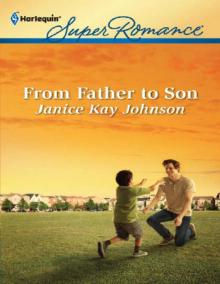 From Father to Son
From Father to Son All the Lost Little Horses (A Desperation Creek Novel Book 2)
All the Lost Little Horses (A Desperation Creek Novel Book 2) Hide the Child
Hide the Child Within Range
Within Range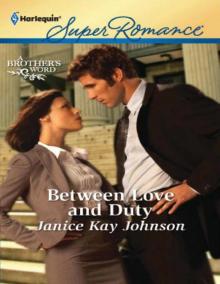 Between Love and Duty
Between Love and Duty First Comes Baby
First Comes Baby Charlotte's Homecoming
Charlotte's Homecoming In A Heartbeat (HQR Superromance)
In A Heartbeat (HQR Superromance)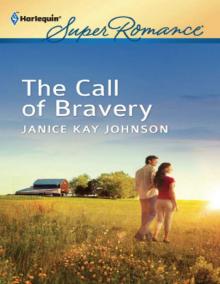 The Call of Bravery
The Call of Bravery In Hope's Shadow
In Hope's Shadow Anything for Her
Anything for Her Harlequin Superromance September 2014 - Bundle 1 of 2: This Good ManPromises Under the Peach TreeHusband by Choice
Harlequin Superromance September 2014 - Bundle 1 of 2: This Good ManPromises Under the Peach TreeHusband by Choice The Baby Agenda
The Baby Agenda More Than Neighbors
More Than Neighbors Her Amish Protectors
Her Amish Protectors All That Remains
All That Remains Whisper of Revenge (A Cape Trouble Novel Book 4)
Whisper of Revenge (A Cape Trouble Novel Book 4) In a Heartbeat
In a Heartbeat A Mother's Claim
A Mother's Claim Because of a Girl
Because of a Girl Back Against the Wall
Back Against the Wall Dangerous Waters
Dangerous Waters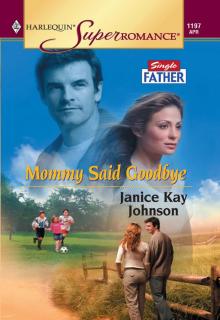 Mommy Said Goodbye
Mommy Said Goodbye A Mother's Secret
A Mother's Secret See How She Runs (A Cape Trouble Novel Book 2)
See How She Runs (A Cape Trouble Novel Book 2) Plain Refuge
Plain Refuge Bringing Maddie Home
Bringing Maddie Home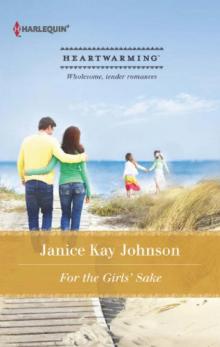 For the Girls' Sake
For the Girls' Sake Through the Sheriff's Eyes
Through the Sheriff's Eyes Yesterday's Gone (Two Daughters Book 1)
Yesterday's Gone (Two Daughters Book 1) All a Man Is
All a Man Is Harlequin Superromance January 2014 - Bundle 1 of 2: Everywhere She GoesA Promise for the BabyThat Summer at the Shore
Harlequin Superromance January 2014 - Bundle 1 of 2: Everywhere She GoesA Promise for the BabyThat Summer at the Shore No Matter What
No Matter What Wakefield College 01 - Where It May Lead
Wakefield College 01 - Where It May Lead Someone Like Her
Someone Like Her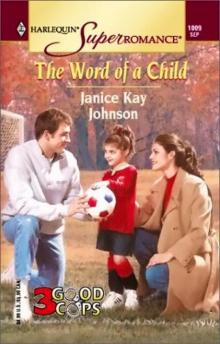 THE WORD OF A CHILD
THE WORD OF A CHILD Harlequin Superromance May 2016 Box Set
Harlequin Superromance May 2016 Box Set Open Secret
Open Secret The New Man
The New Man Finding Her Dad
Finding Her Dad The Perfect Mom
The Perfect Mom All Through The House
All Through The House Match Made in Court
Match Made in Court Making Her Way Home
Making Her Way Home From This Day On
From This Day On To Love a Cop
To Love a Cop The Hero's Redemption
The Hero's Redemption HIS PARTNER'S WIFE
HIS PARTNER'S WIFE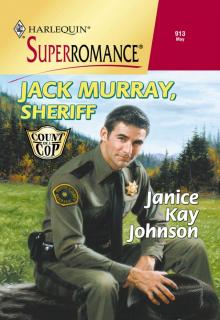 Jack Murray, Sheriff
Jack Murray, Sheriff Dead Wrong
Dead Wrong Twisted Threads (A Cape Trouble Novel Book 3)
Twisted Threads (A Cape Trouble Novel Book 3) Bone Deep
Bone Deep The Closer He Gets
The Closer He Gets With Child
With Child Whose Baby?
Whose Baby? Kids by Christmas
Kids by Christmas